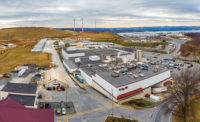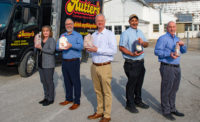Turkey Hill, a high point overlooking the Susquehanna River, is a local landmark in Southeastern Pennsylvania. It is also the name of one of the most successful ice cream, frozen novelty and iced tea companies in the United States.
Turkey Hill Dairy’s customer-focused, locally driven culture goes all the way back to the roots of its name. Derek Frey, director of logistics at Turkey Hill, said that when his great-grandfather Armor Frey founded the dairy in 1931 during the Great Depression, he was just trying to make money selling his family’s extra milk. Originally, he called his company Armor P. Frey Dairy, but that didn’t stick with his customers.
“Once he explained, ‘It’s the farm on Turkey Hill,’ people got it. The first couple of years [it was called] Armor P. Frey Dairy Milk Bottles, and not too long after that it turned into Turkey Hill,” Frey said. “So, the customers named us.”
Smart growth
Turkey Hill, which is still headquartered on the same hilltop in Conestoga, Pa., remained a family business for over 50 years after its founding (and a Frey was president until five years ago). In 1947, three of Armor Frey’s sons bought the business from him. In the 1950s, the Freys began making ice cream from leftover cream, and in the 1960s they introduced ice tea products.
Another early expansion came when home delivery was beginning to decline in the 1960s: The sons decided to open a chain of convenience stores to sell their products, Frey said.
When the Frey brothers reached retirement age in 1987, they decided to sell Turkey Hill to Dillon Companies Inc., a subsidiary of the Cincinnati-based Kroger Co. This was when Turkey Hill shifted from a privately held family business to a publicly held corporation, and the company began to expand beyond its regional roots.
“[That’s] when we would’ve started trying to really get into grocery in a major way,” said Frey.
John Cox, president of Turkey Hill, concurred. He said the 1980s marked a change in the company’s perspective, from “How do you think like a family-run business?” to “How do you think like more of a medium-sized business that’s self-sustaining?”
Cox noted that Turkey Hill has continued to grow based on its existing relationships with customers. If one of its retail partners was selling products in another city, it used this connection to move into new markets.
When grocery stores consolidated in the 2010s, Turkey Hill further expanded its geographic reach. It now sells its products in 48 states and a dozen countries and has the fourth-largest-selling premium ice cream brand in the United States.
Turkey Hill has remained a subsidiary company of Kroger Co. since 1987. However, Kroger recently announced that it is selling Turkey Hill to Peak Rock Capital, an Austin, Texas-based middle-market private equity firm. The sale is expected to go through in the first quarter of Kroger’s fiscal 2019, which ends in late May.
“We here at the dairy are excited about the new possibilities and opportunities that the sale will provide for our future,” said Cox on Turkey’s Hill’s new parent company. “And for now, it’s business as usual for us — we are going to keep making and sharing the great frozen treats and drinks that our customers have come to expect from Turkey Hill.“
Quality wins
Retail trends bear out Turkey Hill’s continued success. According to Tom Aslin, vice president, sales and marketing, in 2018, Turkey Hill sold about $500 million in retail and grew about 2%. Those sales came from of a broad range of products, including 52 premium ice cream offerings, 20 all-natural ice creams, 17 novelties and ice cream cakes, four types of soft-serve mix, nine dairy drinks, 19 premium iced teas and nine premium fruit drinks.
Despite having a plethora of products, Turkey Hill makes sure not to skimp on the quality of its lesser-selling offerings, Cox said.
“We don’t look at the 23rd selling item and go, ‘really doesn’t matter what it tastes like because we don’t sell that much of it anyway.’”
Aslin concurred. He said Turkey Hill cares just as much about its top-selling product (Vanilla ice cream) as every other product it produces as a company.
“[With] that superior quality, we’re trying to delight people or wow them with our flavors or our product offerings, as opposed to some that are great and some that are just okay,” he said.
Cox said this high quality comes from the exacting standards Turkey Hill has at its Conestoga, Pa., plant. Everything that Turkey Hill produces at its plant is Turkey Hill branded, though co-packers do also produce some Turkey Hill products.
“But everything’s made to our standards whether it’s made in our facility … or a third-party contract manufacturer,” Aslin noted.
Progress through innovation
According to Aslin, while geographic expansion has helped Turkey Hill grow, another growth factor has been product innovation. To create new products, the company begins by identifying consumer trends. It then engages in different levels of trials and research, depending on the level of risk/complexity of its new product ideas.
In 2018, the company had one of its most successful product launches in years: a twist on the traditional Neapolitan ice cream flavor called “Trio’politan.” According to Aslin, the new product was a response to the consumer trend of flavor exploration.
“What makes it different is rather than being just vanilla, chocolate and strawberry, it has three different flavors that you would not normally find in Neopolitan,” Aslin added.
Trio’politan flavor combinations include All Natural Chocolate Raspberry Bliss (Vanilla ice cream, Chocolate ice cream and Raspberry ice cream with chocolate chips), American Dream (Blueberry ice cream, Vanilla ice cream with strawberry swirl and Strawberry ice cream with chocolate chips), Coco Loco (Caramel ice cream, Coconut ice cream with Toasted Coconut swirl and Chocolate ice cream) and Triple Chocolate (Milk Chocolate ice cream with fudge swirl, Dark Chocolate ice cream and Chocolate ice cream with chocolate chips). Turkey Hill is expanding the line in 2019 to include flavors such as Triple Vanilla, which is Vanilla Bean ice cream, Brown Sugar Bourbon Vanilla ice cream with vanilla cookie crumb swirl and Homemade Vanilla ice cream.
“Who would have thought Triple Vanilla could be really exciting,” Aslin said, “but it’s an incredible product.”
Another recent product launch is Decadent Delights frozen novelties, which come in two forms: premium ice cream bars swirled with fruit ribbons and dipped in fruit purée or chocolate and premium parfaits with fruit-flavored ice cream swirled with fruit puree and topped with whipped topping. The Decadent Delights bars come in Cherry, Chocolate Covered Strawberry, Coconut, Neapolitan, Triple Chocolate and Tropical Mango flavors. The Trio’politan version launched earlier this year, Aslin noted. The parfaits come in Lemon Blueberry, Strawberry and Mixed Berry flavors.
He added that by combining fruit with decadent premium ice cream, Turkey Hill is responding to the consumer trend for permissive indulgence. The Decadent Delights are primarily marketed toward “the adults in the family,” given the products’ higher price point and premium ingredients.
Another consumer trend that Turkey Hill has responded to is clean label. It launched its All Natural ice cream line to attract consumers who want products containing simple ingredients. Aslin said that the All Natural line has been successful. Its 20 flavor varieties include Belgian-style Chocolate, Vanilla Almond Fudge, Blackberry Swirl and Salted Caramel.
“We also are in the process of reformulating those All Natural varieties to be non-GMO,” Aslin said. “As consumer trends evolve, we’ll continue to evolve the products.”
Turkey Hill’s product innovation isn’t just on the ice cream side. The company also recently launched successful new teas, including Ginger Apple and Blueberry Oolong, Aslin said.
Getting personal
Turkey Hill has the typical repertoire of marketing strategies for its products: TV and digital advertising, social media (Facebook, Twitter, Instagram), PR sampling, events and couponing. But the company also goes above and beyond to connect with its many fans. According to Cox, Turkey Hill has a long history of hosting events to get to know its consumers personally.
“We have a giant cow, and we take it out to fairs and store openings,” he said. “So we’ve done events and interacted with the community for a long time and have been very, very good at it.”
Cox added that Turkey Hill’s step into social media was very intentional. The company wanted to expand the personal relationships it had with customers on a local level to a much larger audience in the digital space.
To accomplish this goal, in 2017, Turkey Hill launched “Turkey Hill Nation,” an online portal that allows it to connect with its “super fans.” It currently has over 60,000 members, said Andrea Nikolaus, Turkey Hill’s public relations and digital coordinator.
“We engage with our super fans and provide them with VIP opportunities,” she added. “We will survey them; we’ll give them opportunities to come out to events.”
Turkey Hill also uses the portal to update its super fans on the latest news and flavors, often before the media are informed.
Aslin said that Turkey Hill wasn’t expecting to get such a large number of members when it launched the platform.
“Our goal was 1,000 members,” he said. “In the first year, we got over 30,000.”
Another method Turkey Hill uses to connect with its customer base is the Turkey Hill Experience: a museum of sorts dedicated to Turkey Hill’s history, production methods and flavors. The “Experience,” as the company colloquially calls it, is located at an old silk plant in Columbia, Pa., 20 minutes from Turkey Hill’s headquarters.
Aslin said the Turkey Hill Experience is an integral part of Turkey Hill’s overall strategy: It provides a home for the brand where people can learn about its history and the quality of its products. Beyond learning about the brand, visitors have the opportunity to try Turkey Hill’s latest flavors, as well as create their own.
“We’re trying to give people the ability to sample more products and get excited about all the varieties we make and feature our new products,” he added.
Cox said the Experience is part of “the relational piece” that makes Turkey Hill distinct from other companies.
“When you come to the Experience Center, that’s the No. 1 goal we are marketing — [having] people go home and say, ‘I’ve met a Turkey Hill employee and I like them,’” he said.
The Turkey Hill Experience has had visitors from all 50 states and many countries. It just had its millionth visitor in 2018, Cox noted. Interestingly, it was a family from Canada, where Turkey Hill’s products aren’t even sold.
“This family had come down to the states, became familiar with our products … and were so excited that it was actually their fourth visit,” he said.
Nikolaus said Turkey Hill is very proud of its passionate fans. She recounted a story of a family who ordered its iced tea to their hotel in Disney World so it would be there when they arrived.
“We have this great variety, and people just get hooked,” she added. “Whether it’s the flavor [or] the quality, we like to provide something for everyone,” she added.
Commitment to local community
In addition to being a way to connect with fans, the Turkey Hill Experience ties into the company’s larger goals of improving its local community. According to Cox, Turkey Hill has been a part of the Economic Development Corp. of Lancaster County, which focuses on building up local business, for a number of years. So when the company was searching for a site for the Experience, it looked for an area where economic development was really needed.
Despite advice from consultants to choose greenfield land, Turkey Hill chose to house the Experience in an abandoned silk mill in Columbia, Pa. Cox said this is part of Turkey Hill’s larger interest in sustainability. This year, Turkey Hill also saw its plant become one of the first ice cream or ice tea facilities to be run on 100% renewable energy.
The company’s view of sustainability goes beyond environmental practices in its plant. It joined a number of local organizations in an effort to make the community more sustainable, to help grow business opportunities and to maintain the local farmland, which Cox said is considered the most productive nonirrigated land in the United States.
For example, along with the Development Corp. of Lancaster County, Turkey Hill partnered with the Lancaster Farmland Trust, which works to preserve the local farmland. Cox noted that this is part of a multifaceted approach to help the community.
“If you’re gonna preserve that farmland, you also have to support urban redevelopment,” he said. “So, it’s a two-pronged attack.”
Turkey Hill also partnered with the Alliance for the Chesapeake Bay and Maryland and Virginia Milk Producers Cooperative Association (MDVA) to help clean up the Chesapeake Bay’s water, Cox noted. To do this, Turkey Hill agreed to ask its milk suppliers to create a conservation plan to reduce nitrous phosphorus and sediment runoff into local rivers. The MDVA helps farmers secure funding to implement these plans, and then Turkey Hill pays a premium for milk from providers who comply with them.
“We think it’s a very novel approach of supporting the farmers in achieving a goal they want to achieve, [and then] getting them help with funding to make it possible,” Cox added.
Frey concurred.
“I think the cool thing about the milk partnership that we have is, you know, a lot of folks … really don’t have the money to execute a lot of these projects. It’s not a lack of will, it’s a lack of resources,” he said. “So, one of the neat things about the Alliance for the Chesapeake … [is] we’re able to do is go out and secure a pretty large amount of grant money to make on-farm improvements. So far I think we’re about $1.5 million.”
Why does Turkey Hill have such a commitment to Lancaster County’s sustainability efforts? The answer is simple, Cox said.
“It’s the right thing to do,” he said.









